5 Foreign Policy Lessons from World War I
What we can learn from the Great War on its centennial.
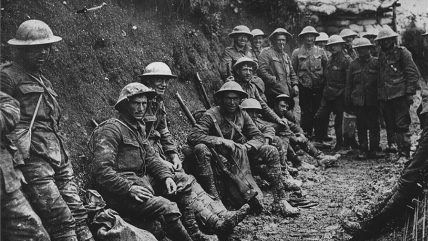
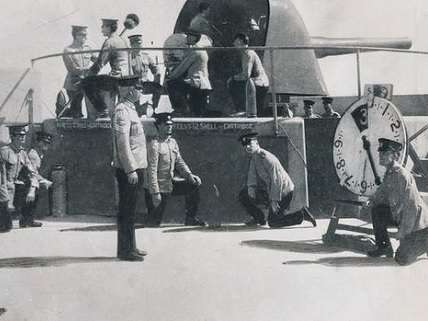
One hundred years ago today a shot fired across the bow of the SS Pfalz from the Point Nepean fort in Victoria, Australia, became the first Allied shot of World War I. It was a warning shot—news of the state of war between the British Empire and Germany had just made its way down to Australia, and the SS Pfalz wasn't going to get away.
The Pfalz was a cargo steamer operated by a private German shipping company. Nevertheless it was seized by the Australian navy, renamed the HMT Boorara, and refitted as a troop ship. After World War I, the Australians eventually sold the German ship to a Greek shipping line. It sank before World War II started. It's an informative war story. The Pfalz was captained that day, 100 years ago, by a local captain. She was carrying no war-specific cargo, and was in fact allowed to leave the Port of Melbourne earlier because no one knew that half a world away a war had started.
The fate of the Pfalz, used by the Australians throughout the war and then sold for a profit, illustrates what happens in war—things get seized, even when they're only tangentially related to the war. Life becomes subordinated to war and the war effort. The conflict between Germany, Britain, and their assortment of allies—secret or otherwise—eventually came to be known as World War I. It caused profound geopolitical changes in Europe, the Middle East, East Asia, and Africa, inspired renewed attempts at international cooperation, and eventually led to World War II.
As we enter the centennial of the "war to end all wars," here are five lessons from that Great War that remain relevant today.
1. There's No Such Thing as "Tangential Risk"
Speaking about the U.S.'s tendency to intervene in foreign affairs in vain attempts to "do something," President Obama defended that kind of pattern of intervention, declaring that that was what American exceptionalism was all about, being willing to "plunge in." The risks to the U.S., he suggested, are only tangential. History, however, is littered with the husks of once great powers toppled by what they considered mere tangential risks. World War I is full of such cautionary tales. Europe's military spending had been accelerating in the years preceding World War I, so the war itself shouldn't have come as much of a surprise to anyone paying attention. European history was defined by war, long before World War I. Its political class was used to it, and didn't see much beyond "tangential risks" in going to war yet again.
None of the players when World War I started in 1914 got through the conflict without being fundamentally changed. Multiple empires—the Austrio-Hungarian, Ottoman, and Russian—ceased to exist after the war, with Russia turning to nearly 75 years of brutal communist rule. Germany lost all of its overseas colonial possessions, and as a result, in part, of World War I, Britain and France would eventually lose theirs. Some of these things might have happened absent World War I—it's hard to imagine, for example, how the already structurally weakened Ottoman or Russian Empires would have survived long-term—but World War I helped bring the events on faster, catching those involved, like the Russian political class, by surprise.
2. Ethnic, Religious, and Other Identity-Based Hatreds Are a Powerful Motivator
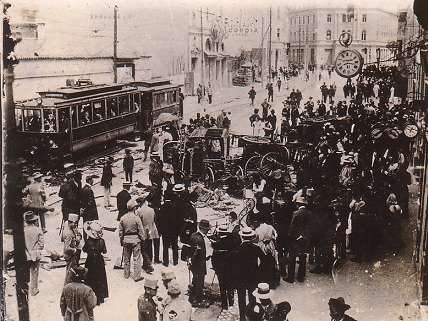
When the Bosnian Serb Gavrilo Princip shot and killed Archduke Franz Ferdinand in Sarajevo, the event barely registered in the capitals of Europe; in fact, it hardly even made the news in Vienna, the capital of Ferdinand's Austrio-Hungarian empire. Princip was a Yugoslav nationalist, seeking to free the Balkans from Austrian rule, and a member of the Black Hand, a group whose aim was Serbian unification. By the end of World War I, Woodrow Wilson, who brought the U.S. into the conflict in 1917, made "self-determination" one of the "Fourteen Points" upon which a post-war Europe could be based. It was close to articulating Princip's goal when he shot and killed Ferdinand as any party to the conflict ever could but it wasn't completely accurate. Ethnic and identity-based hatred was as important a motivator to the forces that tore the Austrio-Hungarian (and Ottoman) empires asunder as "self-determination," a concept alien on a continent whose populations for centuries were ruled by royal houses. The assassination of the Archduke may not have been news in much of Europe, but it was used by the Austrio-Hungarian government to encourage anti-Serb violence in Sarajevo.
3. People Don't Want War, Governments Want War
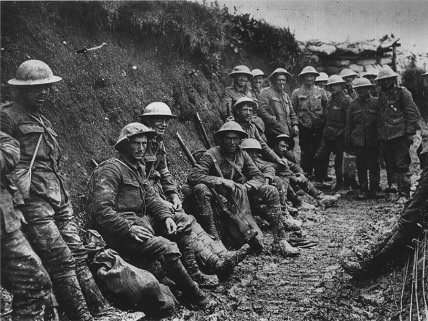
While governments, to one degree or another, certainly need the support of their populations to wage war, they can often manufacture this support by appealing to nationalist fervor and a desire for security. In the run up to World War I, the German government very much wanted Russia to complete its mobilization along the border first, so that it could point to that as the act of aggression that made avoiding war impossible. The armies of World War I were a mix of volunteers and conscripts, but when they got to the trenches few were interested in hostilities. In Evolution of Cooperation, Robert Axelrod's study of the "tit-for-tat" rule in action, the author explains how trenches in World War I became rather peaceful places as the soldiers on either side learned that if they didn't shoot the other side wouldn't shoot back. Toward the end of the war, military leaders had to constantly shuffle soldiers around so that none would be around in any one place long enough to learn not to shoot, doing this even as a final peace was becoming imminent.
4) Entangling Alliances Make Costly Foreign Policy Commitments
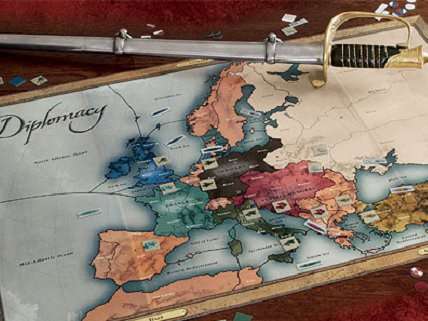
Although many European governments spent the July after the assassination of Archduke Ferdinand maneuvering diplomatically, the Austrio-Hungarian Empire's spat with the Kingdom of Serbia only became an international affair because of the entangling alliances involved. Russia, who paid as steep a price as any country for intervening in the conflict, only became involved because of its alliance with the Serbs. France became a target of Germany, an ally of Austria-Hungary, only because it was an ally of Russia. The British entered to stop the invasion of Belgium. Because most of these countries were not directly affected by instability in the Balkans, they had little incentive to ensure that such instability didn't cause a conflict, even as they (and more accurately, their populations) stood to become very active participants in any conflict that did ignite.
5) One Side's Perspective on the Other's Motivation Is Usually Wrong
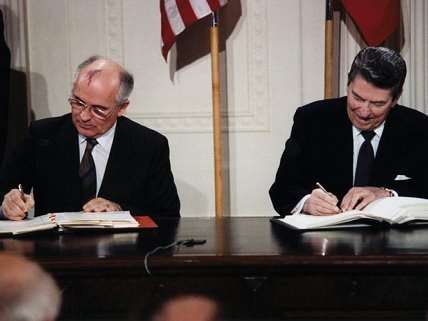
Part of the reason Europe plunged into World War I was that few in the political class thought such a war was possible over a dispute such as the one between Austria and Serbia. In the days leading to the various declarations of war that kicked off August 1914, the different sides pleaded with each other to avoid a conflict even as most were mobilizing troops at their borders. The interpretation of these mobilizations—particularly Russia's by Germany—helped set the pace of the escalating conflict. Although members of Europe's political class spent July talking to each other in an effort to avoid war, it was defined by a more than healthy amount of distrust. Each side based its view of what was happening on what it believed the other side believed, which rarely matched what the other side actually said. Although the sort of "secret diplomacy" that contributed to the misunderstandings that erupted in World War I is far less common today than 100 years ago, our political leaders continue to insist that they know the motivations of other actors better than the actors themselves. While it would be naïve to assume that everyone always tells the truth about all their motivations, it would be just as naïve to assume the opposite, especially in cases where the articulated motivation matches actions taken to date.
Editor's Note: As of February 29, 2024, commenting privileges on reason.com posts are limited to Reason Plus subscribers. Past commenters are grandfathered in for a temporary period. Subscribe here to preserve your ability to comment. Your Reason Plus subscription also gives you an ad-free version of reason.com, along with full access to the digital edition and archives of Reason magazine. We request that comments be civil and on-topic. We do not moderate or assume any responsibility for comments, which are owned by the readers who post them. Comments do not represent the views of reason.com or Reason Foundation. We reserve the right to delete any comment and ban commenters for any reason at any time. Comments may only be edited within 5 minutes of posting. Report abuses.
Please to post comments


Bascially, governments suck.
Governments are the worst mass murderers, plunderers, and general criminals of all time.
No other institution in human history has been able to match the capability for slaughter and wealth destruction like states. Yet people assume we should nonetheless cling on to states like our life, liberty and property depend on it.
Some say that the American education system is failing, but it succeeds brilliantly in its primary function. Rudy Giuliani summed it up, "Schools exist in America and have always existed to train responsible citizens of the United States of America." In context, this "responsible citizens" means human beings who understand that "Freedom is about authority" and who genuinely love the state.
No politician has uttered more sincere words.
Years ago I talked to a guy at a party who was just incensed that the hired security of some corporation had killed a few people in Africa. This showed the horrible deadliness of corporations, which needed to be restrained by governments. The idea that the record of governments was infinitely worse didn't seem to occur to him.
I seem to recall that some of the corporations who hire security do so for protection against the agents of whichever state they are operating in.
Well, yeah. I mean, when governments commit violence it is justified, because governments have the monopoly on justified violence. Therefore when governments do violence it is always justified. Unless the other TEAM is in charge.
"The idea that the record of governments was infinitely worse didn't seem to occur to him."
You have a point, but governments are not infinitely worse. The bloodshed in the Congo over the past couple of decades is worse than anywhere else in the planet, Iraq, Afghanistan included, and governments are not the big actor. Rather it's local warlords who rely on corporate sponsorship who are responsible.
Only because they control the highest population and wealth. It's not like the places today with weak governments don't have violent disputes i.e. middle east. It's all about scale.
State insititutions concentrate population and wealth towards the making of war, it's not simply a matter of scale, it's a matter of magnitude. Otherwise WW1 wouldn't have wiped out 150+ years of wealth accumulation in Europe.
You could hardly call governments in the Middle East 'weak' since virtually every state in that region has virtually unlimited power within their territories. Even if that weren't the case, I don't think it's unreasonable to assert that 500 years worth of skirmishes between small (freely financed) actors could ever match the destruction we saw in 6 years of WW2 or in more than a decade of Vietnam.
Governments with their central banks and income taxation have externalized the cost of war to such an extent that no actor who doesn't rely on taxation to finance the destruction, could possibly hope to match the destructive capacity of those actors whose destructive capabilities are financed through coercive taxation and theft from the unborn.
Superb alt text. Bravo, Ed.
Yet even a mildly opposed population will still march to war with fanfare thanks to taxation. You don't see private people and businesses writing checks to pay the bills associated with military enslavement and industrial style total wars to be waged at home and abroad. Wars like ww1 and ww2 and of course Vietnam, kKorea etc... are only possible with statism. When the actors of violence actually spend their own money to do so, a few less million people get murdered than tends to be the case in tax funded wars where costs have been externalized spread widely.
Propaganda is also indispensable.
Edward Bernays, Wilson's propaganda chief on the Committee on Public Information, literally wrote the book on propaganda. Goebbels learned everything he could from Bernays' WW I work. Even though Bernays was a Jew, Goebbels even tried to get him to autograph a copy of Propaganda.
Naturally, but by that same token the only way to defend against such wars is statism. The Nazis in Eastern Europe didn't stop until they were faced with a similarly industrialized army, for instance.
You generally have the option of either submitting to a belligerent foreigner's certain and permanent tyranny, or hoping for a temporary and lesser domestic tyranny to combat it.
I'm not so sure. We didn't get to see the Nazis invade a stateless society for a demonstration of the thesis that 'only statism can protect against statism.'
Free societies would be places of tremendous wealth, places of far and away higher technology and I think it's possible that there would be a means of resistance or at least the means the impose such high costs on an invasion that attacking such a place would be no trivial task.
But if your thesis was true at all places and times then the Icelandic Commonwealth period wouldn't have lasted for 400 years, though it did eventually succumb to the predations of a Norse King. But only then because Icelanders of the time were more accepting of rulers whereas previous attempts by kings to monopolize power in Iceland was met with failure. 400 years is nothing to scoff at, it's longer than most states can persist and they usually collapse under the weight of their own domestic plundering.
Some slightly more basic lessons;
1) The Balkans have never been anything but trouble.
2) If you want to defend France from an invasion by Germany, bloody well fortify the Belgian border.
3) It is said, often by people who disdain to study any wars at all, that the Military is always studying the last war. In WWI, most of the involved militaries had FAILED to study the last big war between technologically advanced people ? the American Civil War. A lot of that took the leaders by surprise - the horrible casualties, the trench warfare - was rehearsed during the War Between the States. So, ignore the intellectuals and bloody well STUDY THE LAST WAR.
4) If you are going to kick the loser when he's down (see Treaty of Versailles), make sure there is no question that you beat the sonofabitch, or you'll be fighting him again before the century is out.
Wait...I missed the part where the American Civil War was fought in Europe, which would have made the war relevant for the calculations of European statesmen.
/sarc
But the last war was the 1870 Franco-Prussian war. Why would anyone study the war before that?
You would also have studied:
Boer War
Russo-Japanese War
Span-Am War.
The First and Second Balkan Wars 1912-13.
But those weren't between major Euro powers.
And while "the Boer War, the Russo-Japanese War and the Span-Am War" involved European belligerents, they weren't between major European powers.
Did I miss some post?
Sorry, misthread.Meant that for the original "jmomls" post.
I did not mean to contradict yours.
Whew! I thought we were somehow reduplicatng the events from assassination on, eventually leading to a huge (flame) war.
And as regards #4, that's the primary reason the Allies insisted on unconditional surrender, and why they insisted on occupying Germany and Japan.
All the European powers had observers, on both sides, for the Civil War.
Graf von Zeppelin, for example, used what he learned and became a hero of the Franco-Prussian war. What the European powers failed to fully understand was the machine gun.
And the rifle. Euro generals were still using massed fire/bayonet tactics suitable for muskets. A rifle's much longer range and equal rate of fire to the musket made "stand up and run at the enemy" very costly, even during the Civil War.
Bolt-action repeating rifles and the machinegun made it suicide.
The closing battles of the Napoleonic Wars were even a preview of what happens when you combine outdated tactics with modern weapons.
The Battle of Waterloo alone had 75,000 casualties - over half were killed. That should have been a warning.
"A lot of that took the leaders by surprise "
I'm not sure this is true. Churchill was at Omdurman, he saw with his own eyes what machine guns could do to an advancing army. He knew the score.
1) There is no need to make this 5 pages. All 5 things could have easily been on one page.
2) People don't want war? It's only government? Surely, you must be joking. Ok, it's usually a minority of people that want to go to war, but it's not a small minority.
People don't want war? It's only government? Surely, you must be joking. Ok, it's usually a minority of people that want to go to war, but it's not a small minority.
Yeah, I'm calling bullshit on that too. There is plenty of evidence - both written and visual - that large numbers of people in Germany & France were not only supportive but genuinely excited about the conflict. And that number included a significant percentage of the generation that would actually do the fighting.
Things may well have changed once they got to the front, especially several years down the line, but there was excitement in the beginning.
If you took a poll of Americans on Dec. 8th, 1941, you would have found a giant majority who wanted war.
In 1917, not so much.
I believe I recall reading that polls showed quite a bit of support for war even before Pearl Harbor.
Except for Commies. They were too busy taking orders from Stalin to go out in the streets and protest Lend-Lease.
Until 22 Jun 1941, then suddenly their tune changed for some reason.
G?ring: Why, of course, the people don't want war. Why would some poor slob on a farm want to risk his life in a war when the best that he can get out of it is to come back to his farm in one piece? Naturally, the common people don't want war; neither in Russia nor in England nor in America, nor for that matter in Germany. That is understood. But, after all, it is the leaders of the country who determine the policy and it is always a simple matter to drag the people along, whether it is a democracy or a fascist dictatorship or a Parliament or a Communist dictatorship.
Gilbert: There is one difference. In a democracy, the people have some say in the matter through their elected representatives, and in the United States only Congress can declare wars.
G?ring: Oh, that is all well and good, but, voice or no voice, the people can always be brought to the bidding of the leaders. That is easy. All you have to do is tell them they are being attacked and denounce the pacifists for lack of patriotism and exposing the country to danger. It works the same way in any country.
http://www.snopes.com/quotes/goering.asp
You're correct, obviously. But my comment was in the context of World War I.
I can't remember where I read it (maybe Niall Ferguson's Pity of War) but there has been some good research in the last few decades that the idea of an unwilling generation being led blindly into war by their elders was constructed in the 1920s to exonerate the younger generation.
A lot of British & American support for WWI came from young progressives who believed it was the last act of purging required for a peaceful world.
A lot of British & American support for WWI came from young progressives who believed it was the last act of purging required for a peaceful world.
They also believed that the War Economy showed that Central Planning Works and planned to use the war to Reconstruct society afterwards.
Maybe, but very few people really have that idealism. It required a lot of phych engineering to get people good and ready for war in the US - and three years to do it.
For the continentals, well, going to war was pretty much old hat by that point. Before WWI, Europeans approached the idea the same way they look at the World Cup these days. The idea was they'd go to war, fight for 6 months, the leaders of France and Germany would come to a gentleman's agreement ending the war and back to Paris for baguettes. I may be oversimplifying things a bit but at the outset no one really had an idea of where it would lead to.
I would think it would be pretty hard to create such a war economy without quite a bit popular support.
I recall the Germans didn't really become antiwar until 1918 when they realized that defeat was imminent.
And the French didn't get too upset until 1917 and the Army mutinies were more about the pointless costly offensives rather than a call to end the war.
Agree again. But, it still points to enthusiasm for the war which runs counter to one of the points in the article.
One relevant pic:
http://www.thelocal.de/2014080.....minent-war
Not even close to being true. Prussia fought wars because they thought that, with their peculiar geography, they would be easy pickings for other countries if they didn't expand their borders to include large parts of the German-speaking world. France had not been the belligerent in a major war since Napoleon, and the Congress of Vienna system was pretty good at creating peace; at least as good as the Pax Americana which followed WWII. What caused WWI was a radical breakdown of the system which preceded it, not a rational continuation of same.
Well, you're likely right. WWI really isn't my area of expertise.
WWI really isn't my area of expertise.
Yet you felt you had enough expertise to talk about the situation just before the war.
The idea was they'd go to war, fight for 6 months, the leaders of France and Germany would come to a gentleman's agreement ending the war and back to Paris for baguettes.
Bit odd considering the actual events of the Franco-Prussian war and things like the Siege of Paris or the Paris Commune.
Winston, if it weren't for uninformed opinions the internet would be nothing but porno and lolcats 😉 He had information I didn't and I'm conceding the point. Shall I argue pointlessly?
I know one guy who would say yes.
Very nice Virginian, and thank you for being gracious, Susan -- more so than I have been in many arguments, both IRL and on the internet.
Goring has to be my favourite Nazi.
There are plenty of psychopaths who think that war is glorious. Consider how many people think Teddy Roosevelt was an exemplary president. The same Roosevelt about whom Mark Twain described as "clearly insane . . . and insanest upon war and its supreme glories"
Didn't know about the Twain quote, CTE. Thanks.
I like Teddy because he was larger than life. Bat shit crazy? Probably a little bit, but hey ... he wasn't FDR!
And yet the world would almost certainly be a better place if the common ancestor of those Roosevelt cousins had been castrated.
"All 5 things could have easily been on one page."
But there are important lessons in Foreign Policy that he missed. I'm thinking of the failure of Internationalism. All the Socialist parties of Europe had a peace platform and stressed international solidarity among the working classes. One by one they abandoned this and came round to supporting the war. I think WWI is arguably Internationalism's first and foremost failure.
WWI trivia:
The British believed the war would be short, and won by maneuver, and so resisted for quite a while the idea of building elaborate trench systems. The Germans knew better, and their trenches were far more comfortable.
The Germans were clever in building machine gun nests. Instead of firing straight at the enemy, the front of the nest would be solid and they would fire out from the sides, at an angle. This made them harder to spot and more effective.
The German strategic bombing of England (by Gotha bomber and Zeppelin) was limited, and they decided that it wasn't worth the expense. As a result, in WWII the Luftwaffe concentrated on short-range bombers for troop support, and not long-range bombers. But the British were quite upset at being bombed, and as a result built plenty of long-range heavy bombers for WWII.
I don't think that's true. At the outset, the entire German war strategy depended on a quick victory on the western front. That had been German military doctrine for fighting a two-front war for decades (the Schlieffen Plan).
Perhaps I should have written that the Germans learned much quicker than the British that the war would not be won easily, and built better trenches sooner.
They also revolutionized the idea of attacking deep and not wide. That is to say they would use elite stromtroopers to make a small breach and then exploit at breach with regulars. Evidently that worked get than getting on line.
It's also important to note that with machinegunning that type of fire does a better job of protecting a long front. We still interlock fire like that to this day.
You know who else learned lessons from World War I?
Churchill?
John Ronald Reuel Tolkien?
The Armenians?
You Know Who Else didn't like Young Turks?
Billy Hayes?
How hypnosis turned Hitler from a morose loner with no leadership ability into a man who felt it was his destiny to save Germany.
Johnny Fuckerfaster.
The Sandwich that Started a World War
Cracked is a great site.
This is entirely too dogmatic. For every WWI, there are plenty of examples of either contained wars, or wars where costs can be reasonably anticipated. (Indeed, if my reading of WWI histories is any guide, plenty of the participants thought WWI would be revolutionary in its aims and scope rather than localized to the Balkans -- especially the Germans and the French.)
Governments are comprised of people, and in many cases people want war. The rise of conscription and mass warfare went hand in hand with the rise of democracy, and it is of course silly to make this point directly after pointing out how powerful a force nationalism can be. Certainly there was no lack of democratic support for WWI.
Often true, but irrelevant since actors in foreign policy must inevitably make these calculations before hostilities begin.
I remember when CNN was broadcasting from Iraq when Bush the First was dropping bombs on Baghdad, and watching people cheering "America! Fuck yeah!"
So all that crap about government wanting war, not the people, is a bunch of shit.
And recall the cheering in the street when Obama killed Osama with his bare hands.
Goddamn there are hot videos of Sofia Vergara on YouTube....
It's certainly true that the governments can force an unwilling populace into war and said populace might end up supporting war to avoid being conquered but wasn't there actually quite a bit of support for WWI during the actual war? One can't send millions of men to killed and completely take over the economy without quite a bit of popular support?
The Germans didn't really become antiwar until 1918 when they realized they were going to be defeated. The French Army Mutinies occurred in 1917 and they were more of complaints about tactics rather than an embracement of pacifism. And Russia didn't start to become antiwar until they realized how poorly the Army was doing.
And Russia didn't start to become antiwar until they realized how poorly the Army was doing.
Yeah, when you send new recruits to the front without weapons and tell them to get guns from the corpses of the previous recruits, not a winning strategy.
Also, by 1916/7, a lot of Russian troops were getting letters from their families telling them they had no food or fuel. Hard to fight for a government that can't feed your loved ones.
Yeah, when you send new recruits to the front without weapons and tell them to get guns from the corpses of the previous recruits, not a winning strategy.
Didn't the Soviet do the same in WWII? Irony!
Not sure, but they did political prisoners to the front, in the winter, without weapons and wearing dark-colored overcoats so the Germans would see them and not the Siberians following them.
These guys really know what time it is.
http://www.AnonWorld.tk
Yeah, but do they know where their towel is?
If they're hoopy froods they do.
+1 Ford Prefect
Actually, it is interesting that "the first Allied shot of World War I" was fired in Australia, since I remember hearing that in some parts of OZ there was, in fact, some reluctance to go to war in favor of empire, since, in at least some states there were significant numbers of German immigrants, not to mention the large numbers of Irish immigrants in states like Victoria.
Likewise, in Canada, especially Quebec. In addition to there being little sympathy for the British Empire cause, there was little sympathy for France either. Quebeckers, for the most part, felt that France had abandoned them in the New World centuries before.
In the end, of course, the dominions rallied to the cause.
Next to New Zealand, Australia and Canada had the highest war casualties per capita of any of the allied nations.
Keep the right wing strong?
Rather than these "oh my, how did that happen" complex explanations, I think it's pretty clear that WWI was about the ambitions of the German leaders to make Germany a world power and the efforts of the other European nations trying to prevent that. And it's not that they saw war as a tangential risk in the sense of it not happening, they simply didn't care. They probably underestimated the cost of war, but not the probability (sadly, the same is probably true of US presidents when they get involved in places).
And although people love to talk about the "hatred" various Europeans supposedly felt for each other, that was a hatred instilled into them by their leadership. Most people would have known a Parisian from a Prussian, or given one whit about Alsace-Lorraine, or wanted to spend years in military service losing their lives, if it hadn't been drilled into them in government run schools and through government directed media.
The real question that remains is WTF the US was doing in that war, or messing around in the aftermath. The only two reasons I can see are big financial interests and Wilson's vanity. And the Treaty of Versailles was a testament to incompetent statesmanship, replacing meaningful limits on the ability to wage war with meaningless talk and promises. Keynes and Wilson were, of course, wrong, as usual.
Them being wrong was the least of it. Wilson was ideologically committed to quashing freedom, plundering wealth and making war. Keynes was the man who provided the ideological support for mass theft, mass murder and the strangulation of freedom.
They stand among the most awful humans who ever lived. Child murderers are pretty awful but they usually only killed one or two kids, whereas the policies of Wilson and the intellectual support of Keynes killed untold scores of men, women and children. Fuck em.
They deserve to have their grave stones replaced with toilets and their coffins be retrofitted for use as septic tanks.
Start working at home with Google. It's a great work at home opportunity. Just work for few hours. I earn up to $100 a day. I can't believe how easy it was once I tried it out. http://www.Fox81.com
Islam is the Religion of Peace.
An outstanding article that anyone with an inkling of interest in world history should read and reread. And a good reminder to beware of a hysterical American media and entangling foreign treaties. A brief comment about #3 - the people don't want war. That is true to a degree. But many were enthusiastic in 1914 when chauvinistic attitudes were in vogue. There was a thrist for military glory. Blind patriotism ran hot. The papers whipped up the people to fight. But this warlike spirit soon expired in the face of death, hunger, and fear.
new balance shoes
new balance outlet
new balance shoes
cheap nike air max
Nike Air Jordan Retro Shoes Online Store
Cheap Jordan Shoes,Nike Air Jordans Cheap